- Home
- Michael Crichton
Drug of Choice Page 14
Drug of Choice Read online
Page 14
“What business?”
Jerry turned, picked up a newspaper clipping from on top of the refrigerator, and handed it to Clark.
He read it quickly. The headline said DOCTOR COMMITTED. The story was brief and vague, describing how Dr. Roger Clark, a resident at the Los Angeles Memorial Hospital, had attacked a medical secretary, Miss Janice Connor. She had called the police and Clark had been retained in custody by the police; later, when she declined to press charges, he was released into the care of Dr. Harvey Blood for institutional treatment.
“Oh,” Clark said.
“I got to admit,” Jerry said, “you don’t seem too crazy to me, just a little confused.”
“You’ve been clearer yourself,” Clark said. He tapped the article with his finger. “This is a frame, Jerry.”
“A frame?”
“Yeah. This guy Blood arranged for me to be shipped off to a Caribbean island, where they give the guests all these drugs, and then—”
“Now, Rog…”
“It’s the truth, I swear it.”
“I’m willing to believe you, Rog, but I’m not the one you have to convince.”
At that moment, he heard sirens in the distance, but coming closer.
“What’s that?”
“What’s what?” Jerry said innocently.
“Oh, for Christ’s sake,” Clark said. He went to the bedroom and looked in. Linda was there, cowering in the bed, still holding the telephone.
“Thanks for everything,” Clark said.
He ran.
He drove off just as the first of the police cars pulled up in front of Jerry’s apartment building. It was now four in the morning; the first dawn was lightening the sky over the mountains to the east.
Time was very important now. In daylight, they would have him, and daylight was only a few hours away. He felt his old anger returning, the blind rage which made him sweat and shiver.
He was all alone—he knew that now. Nobody could help him. He had to find a solution by himself, and he had to find it quickly.
To begin with, he needed materials. But where would he find them?
Only one place came to mind: the hospital.
He slipped in through the service entrance, and made his way along the underground tunnels to the elevators. No one saw him; he was alone with his echoing footsteps and the hissing pipes overhead.
At the elevator, he pressed the fourth floor button, and held it. The doors closed, and the elevator ascended smoothly, without stopping at any intermediate floors.
At the fourth floor, the doors opened. He went out. Directly ahead was a sign: TO OPERATING ROOMS.
This was where he wanted to be.
22. BACK IN THE U.S.S.R.
DOWN THE HALLWAY WAS the utility closet. He ducked in and found a pair of coveralls and the blue shirt that maintenance men wore; there was also a transistor radio hanging on a peg. The night men often carried a transistor around with them for company. He put on the coveralls and shirt, hung the transistor from the strap around his shoulder, and turned it on.
It was a Beatles song; he paid little attention as he pushed the large utility cart forward. On the cart were several trays of supplies, and a large cloth sack at one end, open at the top, for garbage disposal.
He pushed the cart into the operating area, through the swinging doors, his transistor going full blast. There was a night nurse at the registration desk, next to the large blackboard where the day’s operations were scheduled and crossed off when completed; there were two recovery room nurses walking around, and a maintenance man waxing the floors in OR 2.
Nobody paid any attention to him, though the night nurse glanced up when she heard the music. He pushed his cart through to the supply room, and busied himself cleaning out the wastebaskets. A technician was there, hunting among the shelves of supplies that ran from floor to ceiling.
She turned to him. “We’re out of Kellys,” she said.
“What?”
“We’re out of Kellys. Order more from central supply, will you?”
“All right,” he said.
The technician left; he was alone in the room. Swiftly, he pushed the cart down to the anesthesia supplies. There were several cans of ether on the lowest shelf. Alongside was a sign: “Authorized Personnel Only.”
He scooped up six of the cans and set them onto the shelf of the cart. Then, looking further, he saw a timer used to record the anesthetic induction times; it was a mechanical, spring-wound affair, but quite accurate.
Lastly, he found an oxygen cylinder. It was a small one, just a few cubic feet, but quite heavy. He could carry it under one arm, but it weighed twenty pounds.
He looked around, found the stickers, and pasted one across the cylinder: EMPTY RETURN TO GAS LABORATORY FOR REFILLING.
A few minutes later, he was back in the utility closet, shucking off his overalls.
“Gee, I had a dreadful flight,” went the song on the radio.
He flicked it off, gathered up the equipment, wrapped the coveralls around it, and walked out to the elevator.
Once outside the hospital, he had a moment of elation. He had done it; he had pulled it off. He drove away into the early morning, and as he drove his elation disappeared.
The most difficult part was still ahead.
It took him twenty minutes, driving on back roads and through residential districts, to reach the Santa Monica Freeway. From there, it was twelve minutes to the Los Calos exit. The sun was beginning to appear above the mountains as he turned off the freeway, and onto the small road that led north, to Advance, Inc.
It was quite light when he reached the black sign by the road; he drove a quarter mile beyond, then pulled the car off the road and into the woods. He walked back to the road and tried to hide the tire tracks, but it was difficult, and he abandoned the attempt after a few minutes.
He returned to the car, got out his material, and crept through the woods toward Advance. It was fifteen minutes before he came to the rise in the hill, and was able to look down over the glass building and the parking lot. There were two police cars in the lot, next to the limousine. The cops were standing around, talking to a short man whom he recognized as Harvey Blood.
They seemed to be having an argument; Blood was waving his hands and speaking earnestly, while the cops stood around frowning.
He looked from the parking lot toward the building itself, his eyes going along the ground floor windows to those of his own lab. He usually left one window open, though he was not supposed to. He hated stuffy labs in the morning.
He saw the window: he was in luck. It was open.
Back at the parking lot, Blood seemed to be winning his argument. The cops shrugged and climbed into their cars, and drove off. One, however, remained behind, standing at the entrance to the building.
As the police cars left, Harvey Blood went into the building. The cop remained outside. He took his gun from his holster, checked it, and put it back, leaving the flap loose.
In the early morning light, he practiced a quick draw, then nodded to himself, apparently satisfied, and sat down on the steps.
Clark waited.
A light went on in Harvey Blood’s office.
Clark moved down the hillside.
He had planned to move stealthily; he envisioned himself sliding like a silent shadow down the hill. Instead, he stumbled and fell, rolling over and over, the heavy oxygen cylinder clanging on the rocks.
At the foot of the hill, winded, ribs aching, he paused. The sound had seemed unbearably loud: the cop at the front of the building must have heard.
He scrambled forward to his open window, pushed it wide, and looked into the lab. The lights were out and the lab was empty. He pushed his equipment through the window, easing it gently to the floor. Then he climbed up and through, dropping down and waiting.
Two minutes passed, and then the cop appeared. He was walking along the rear of the building, gun out, eyes up to the hillside.
Clark could see the t
rack he had left coming down the hill. The long grass was trampled in an unmistakable path. He held his breath and waited.
The cop didn’t notice. He moved on.
Clark continued to wait, huddled down on the floor, his face pressed up against the cool oxygen bottle. Another three minutes passed, and the cop returned, walking back around to the front.
When he was finally gone, Clark stood. He walked around the benches of the lab, searching for something that would do the trick. He needed something that would work slowly…
The hot plate.
He paused. Perfect!
It was a simple hot plate, a single burner of the kind used by little old ladies in retirement apartments. In the lab, it was employed to heat reagents and bottles of liquid. It had a single coil which glowed red-hot in a matter of minutes.
Perfect.
He spent the next few moments cutting the wires to the coil, and hooking them into the anesthesia timer. He wasn’t sure about the connections, but there was no time to make them more secure. Glancing at his watch, he saw that it was already six-fifteen.
No time.
He collected all his gear and looked around him. He needed an airtight room, now, a perfectly airtight room. His own lab would never do.
But he knew someplace that would.
Fortunately, he had kept the keychain from Sam, the night guard, so he had keys to open any room in the building. It was the work of a few moments to slip down the hallway and into George K. Washington’s lab.
He hesitated as he entered. Directly ahead was the chair, the tracks, and the door leading to the soundproofed room. He felt a kind of deep revulsion, and for an instant he thought he could not make himself enter the room. Then he heard footsteps outside, and Harvey Blood’s voice saying “…be back, I know he will…”
Clark smiled grimly.
He opened the door to the soundproofed room, and set the hot plate on the ground, resting it on the baffles. He plugged it into a socket, and twisted the timer to fifteen minutes. It began ticking softly.
Then, he set the oxygen cylinder on the floor nearby, and opened the valve a half turn. He heard a hissing and felt me coolness of the gas.
Finally, he took the small cylinders of ether, pulled the corks, and sprinkled the liquid around the room. The burning, acrid odor of ether stung his nostrils and made his eyes water; after two cans, he was not sure he could go on, it was making him dizzy, but he forced himself.
He managed to empty six cylinders, and threw in a seventh for good measure.
Then, coughing, he went back, and slammed the door shut. It closed heavily.
He checked his watch: fourteen minutes left.
It was not, he thought, the best explosive in the world, but it would do. Ether and air was reasonably powerful; ether and oxygen, pure oxygen, would be extremely potent. The enclosed space of the room would do the rest.
When that room exploded, it would really go. Smiling, he went back to his lab.
As he took the pink vial off the shelf and mixed two grams in water, a part of him was horrified. The deliberate cruelty of it shocked him. But another part of him was pleased and excited by what he was about to do.
In a way, he thought, it was fitting. He mixed the solution, and filled a syringe. Then he slipped on a labcoat, dropped the syringe in his pocket, and went to pay a final visit on Harvey Blood.
There were eleven minutes left.
“Hello, Roger,” Harvey Blood said calmly, looking up from his desk. “I see you’re back.”
“Yes,” Clark said. “I’m back.”
“You led the police a merry chase, Roger.”
“Yes. I did.”
“But I knew you’d come back,” Blood said. “I knew it all along. You see, Roger, we arranged everything so that you would have to come back.”
“Yes,” Clark said. “That’s true.”
“The effects of our treatment wore off,” Blood said. “We knew it was happening. We watched you change for the last few weeks. We knew that eventually you would do this, and we were prepared for it.”
“Prepared?”
“Yes. In fact, we’ve been counting on you to make your escape, and to act in a bizarre fashion. Which, naturally, you did. We needed that for legal reasons.”
“What reasons?”
Blood sighed. “Poor Roger. You never will understand, will you? We needed this final evidence in order to certify you insane.”
Harvey Blood sat back in his chair and looked steadily at Clark… “The corporation is overextended,” he said. “Now do you understand?”
Clark sat down. “No.”
“We had very good initial success, with some viruses which we sold to the government. Then we developed the drug, and put it to use in the resort. Another success. We grew bolder—began branching out, working on a wide variety of projects. We accepted contracts from a number of companies. Contracts, Roger, which we have been unable to fill.”
Clark frowned.
“In fact,” Blood said, “we began to find ourselves in great financial trouble. So much trouble, that our good projects—the ones that were panning out, the ones that promised success, the ones like Glow Girl—couldn’t be properly funded. Glow Girl was initially planned for a million. Yesterday, we found that we had only eighty thousand available for it. It’s embarrassing, Roger. Very embarrassing. Half our projects aren’t working out, and the others we can’t finance.” Clark glanced at his watch. “How much time?” Harvey Blood asked mildly. Clark said nothing.
“Oh, there’s no point in trying to hide it. We know what’s happening. For example,” he said, “I just got a call from the police. They notified me that the LA Memorial Hospital had just been robbed. A peculiar robbery—some ether and some oxygen. Now who would take ether and oxygen, Roger?”
Clark felt everything sliding away from him, his plans, his preparations, all of it disappearing into some awful master plan.
“I’ve been a fool,” he said. There were ten minutes left.
23. FOOLS WALK OUT
“NOT A FOOL, ROGER,” Harvey Blood said. “Just nearsighted. You mustn’t let it depress you. It could have happened to anybody. Speaking for the corporation, I must say we are all very pleased at the way you’ve worked out. You’ve been a great help to us, a great help. And now, when you destroy this building, you will have performed an invaluable service. We can’t thank you enough.”
There was still time, Clark thought, to go back and pull the plug. Still time to call it off…
“The fact is,” Blood continued, “that we’ve removed all our notes and data from the building. We did it four days ago, because we knew you’d make your move soon. Assuming you are an efficient deviser of homemade bombs—and ether and oxygen should be efficient enough—we can expect this entire building to be demolished. Think what that will mean: no building, no labs, nothing. Obviously we cannot complete our contractual obligations. Obviously, the insurance clauses which cover such contracts will be invoked. And obviously, the insurance on this building itself—five million dollars, and a little more—will go far toward financing our viable projects. So you see, it will all work out nicely.”
Clark found his voice at last. “And me?”
“Well, I admit you pose a problem. You’re quite mad. You’ve attacked a girl, you escaped from my care and flew around the Caribbean, and now you escaped again, threatening friends and acquaintances. And to climax it all, you destroy a corporation. Quite mad. I have no doubt that the courts will find you homicidal and destructive in the extreme, and will want to institutionalize you in a state hospital.”
“I see. But I’ll—”
“Talk? You will indeed. And that is why you pose a problem.”
“You’re going to kill me.”
“Well, not immediately, Roger. Not immediately.”
Clark stood up. “You have it all worked out,” he said. “You’ve always had it worked out, from the very beginning.”
“We like to think
so,” Blood said.
Silently, Clark removed the syringe from his pocket and set it on the desk. The pink liquid was clearly visible.
“Have you thought about this?” he asked.
Harvey Blood did not move. His face was expressionless as he stared at the syringe.
“Roger, you’re being foolish.”
“I think I’m finally being smart.”
“Roger, there’s no need—”
“I disagree.” Clark picked up the syringe and held it to the light, squeezing the plunger slightly so that the air bubbles were pushed out. A fine stream of liquid shot into the air. “Roger, that’s a large dose—”
Blood was reaching into the desk drawer. In a swift movement, Clark came around the desk, shoved the drawer shut with his knee. Blood screamed.
Clark jabbed the needle into Blood’s arm, right through his clothing. He felt it enter the skin and muscle; he squeezed out the contents.
Blood did not move. His mouth fell open in horror, and he clutched his arm.
Clark pushed him away from the desk, opened the drawer, and removed the gun. Alongside it in the drawer was a small tuning fork.
He held it up to Blood and smiled.
“Listen Roger,” Harvey Blood said, speaking very rapidly, “listen, we can work something out.”
“No, we can’t.”
“Listen, Roger, you’re being ridiculous. If you think by all this that you can stop the corporation—”
“I can stop you.”
“—you’re wrong. I’m not alone. Advance is not alone. All over the country, corporations are springing up. What we don’t do, somebody else will carry out. It’s impossible to stop us. It’s the wave of the future. It’s coming, like it or not.” Clark held the tuning fork loosely in his hand. “Don’t you see?” Harvey Blood said. “Don’t you understand? You’re fighting for a principle that doesn’t exist. Already you are manipulated, pushed, pulled, tugged by your world. Do you think a car is beautiful? If you do, it is only because somebody paid millions in advertising to make you think so. Do you find a woman attractive? If you do, it is only because someone planned the fashion, the clothing, the walk, the talk—”

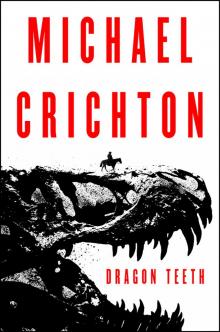 Dragon Teeth
Dragon Teeth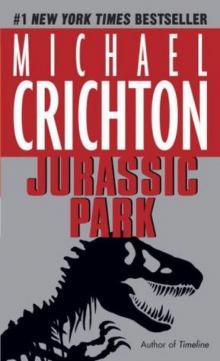 Jurassic Park
Jurassic Park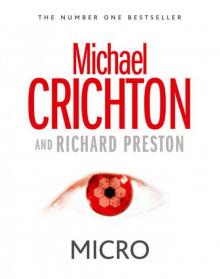 Micro
Micro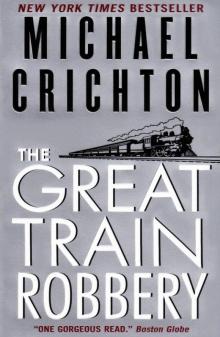 The Great Train Robbery
The Great Train Robbery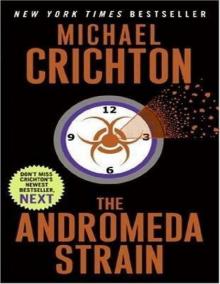 The Andromeda Strain
The Andromeda Strain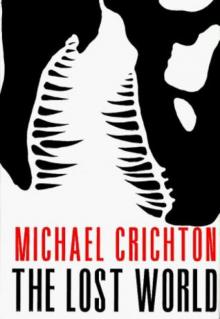 The Lost World
The Lost World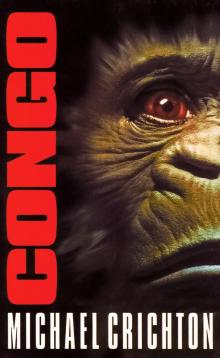 Congo
Congo Travels
Travels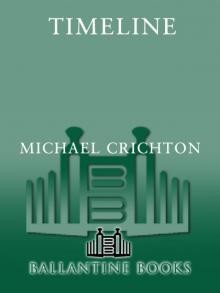 Timeline
Timeline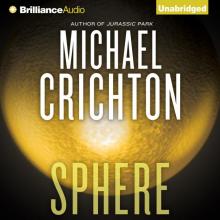 Sphere
Sphere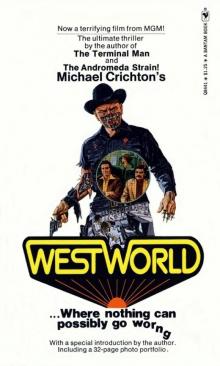 Westworld
Westworld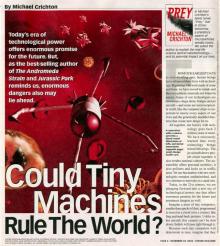 Prey
Prey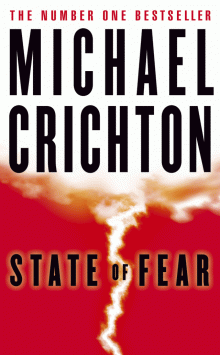 State Of Fear
State Of Fear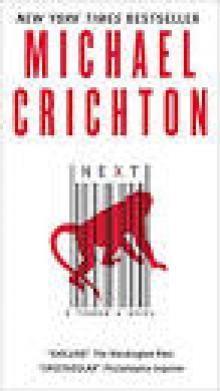 Next
Next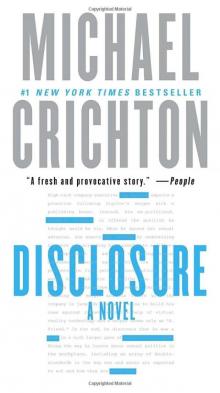 Disclosure
Disclosure Pirate Latitudes
Pirate Latitudes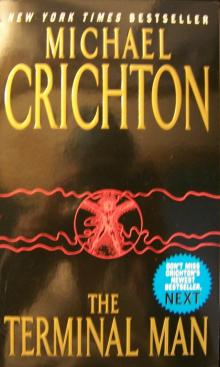 The Terminal Man
The Terminal Man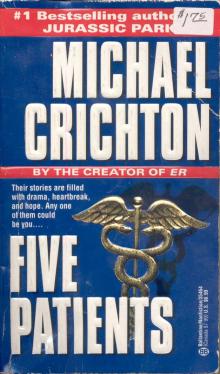 Five Patients
Five Patients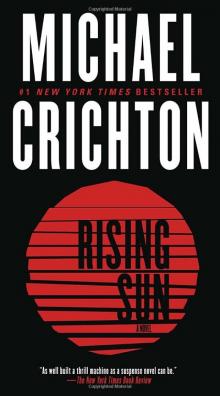 Rising Sun
Rising Sun Binary
Binary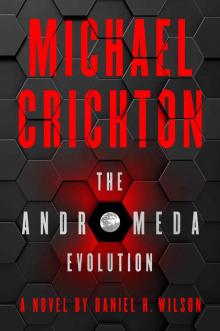 The Andromeda Evolution
The Andromeda Evolution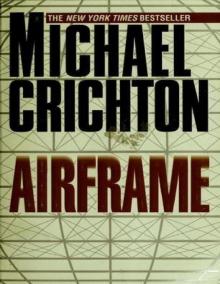 Airframe
Airframe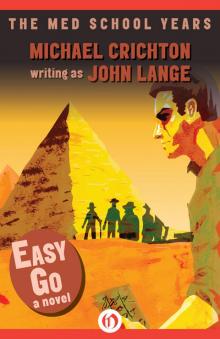 Easy Go
Easy Go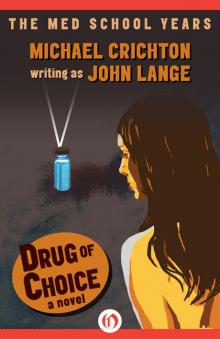 Drug of Choice
Drug of Choice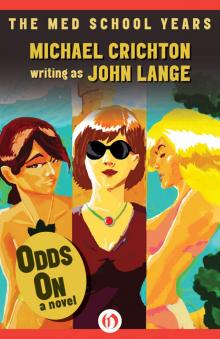 Odds On: A Novel
Odds On: A Novel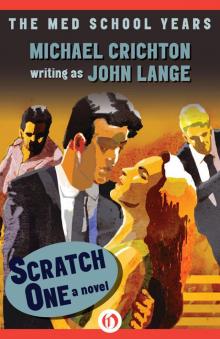 Scratch One
Scratch One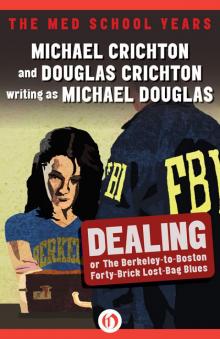 Dealing or The Berkeley-to-Boston Forty-Brick Lost-Bag Blues
Dealing or The Berkeley-to-Boston Forty-Brick Lost-Bag Blues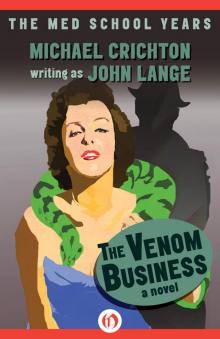 Venom Business
Venom Business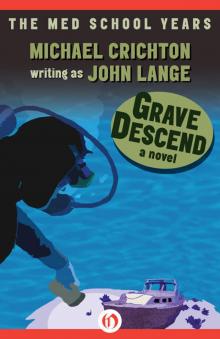 Grave Descend
Grave Descend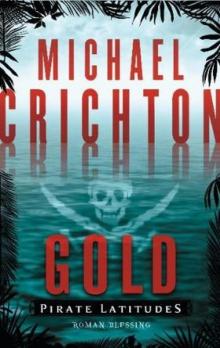 Gold - Pirate Latitudes
Gold - Pirate Latitudes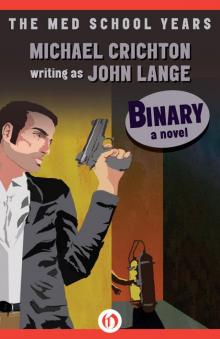 Binary: A Novel
Binary: A Novel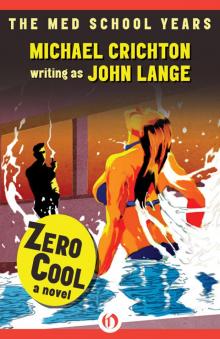 Zero Cool
Zero Cool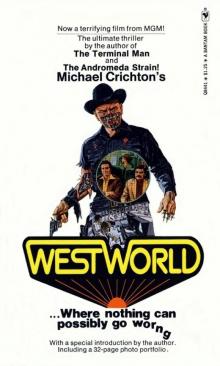 Delos 1 - Westworld
Delos 1 - Westworld